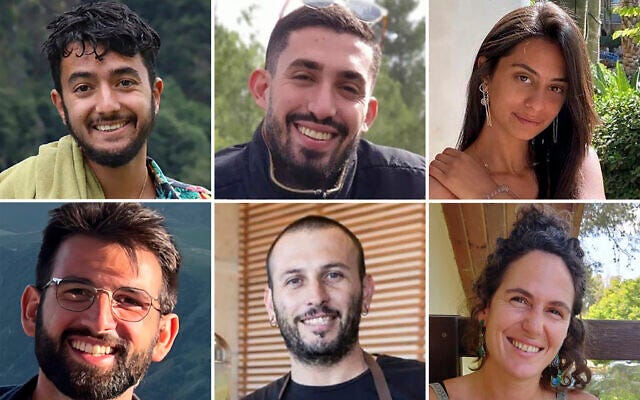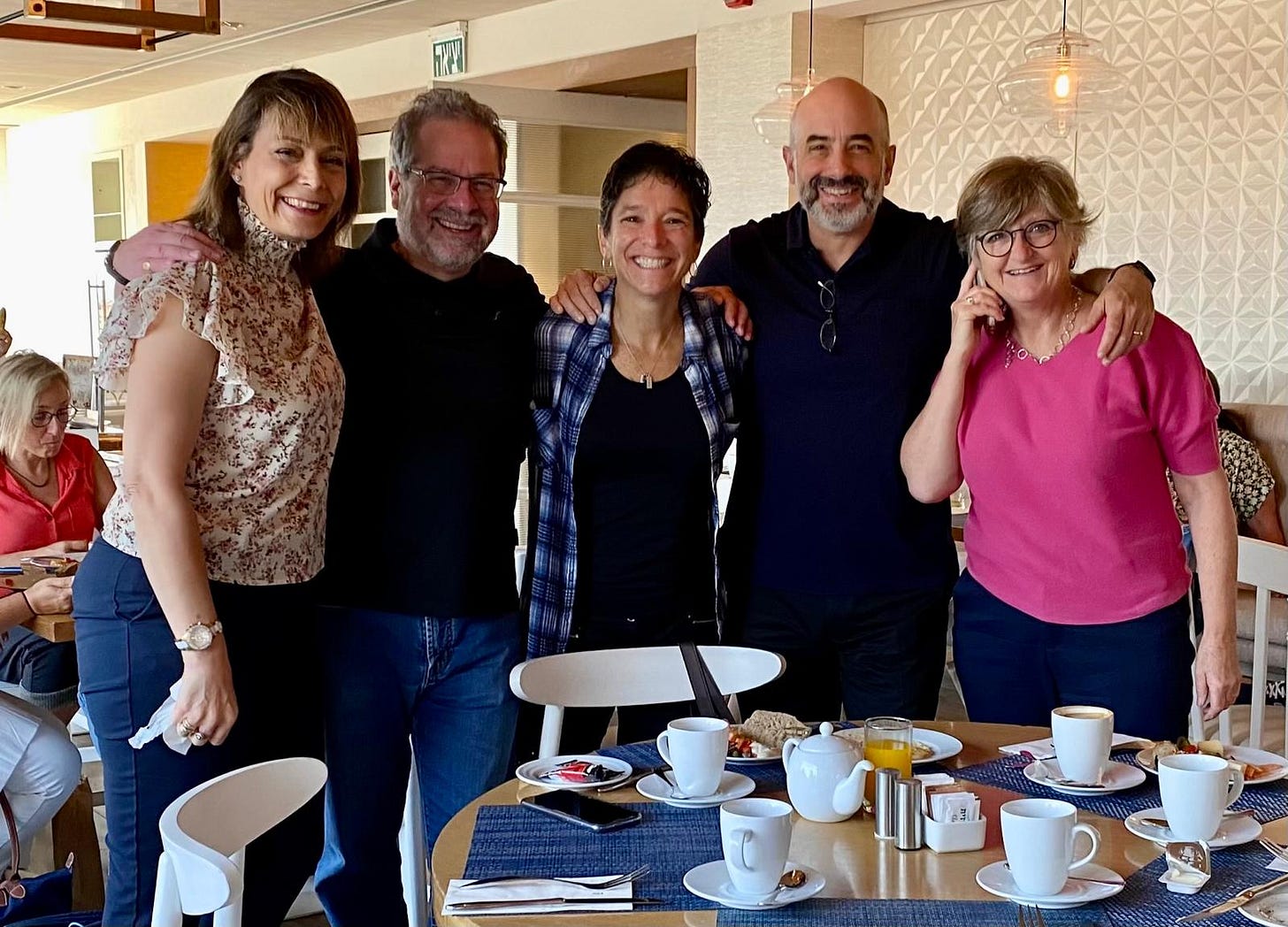An armchair historian, I have often been struck by the contrast between the scope of monumental events and the seemingly small number of heroes who come to embody them. Of the Shoah (the Holocaust) we have room in our consciousness for Anne Frank, Raoul Wallenberg, Mordecai Anielewicz, Oscar Schindler and Elie Wiesel – perhaps a handful of others, mostly owing to books and movies that brought them to popular awareness.
So it will be with this moment – the nightmare of October 7, and its aftermath. Perhaps all the more so as we mourn 6 murdered hostages who have come to occupy our now broken hearts following their discovery less than two weeks ago by those who’d worked endlessly to rescue them. Hersh Goldberg-Polin, Ori Danino, Eden Yerushalmi, Almog Sarusi, Alexander Lobanov and Carmel Gat, now occupy a hallowed place among our shattered people. The circumstances of their brutal murders coupled with the gripping, heart-rending and ultimately futile campaign to secure their release, waged on their behalf by Hersh’s parents, Rachel and Jon, who were a constant presence on the global stage and in the English media, will remain with many of us for as long as we live.
Yet nearly each passing day brings the awful news of another of the fallen – soldiers killed in combat, Israelis murdered in terror attacks or rocket strikes. Still others among our defenders in this war succumb to illness and accidents – far more innocuous and commonplace ends – but ends no less final, no less devastating. Each a hero. Each worthy of our acknowledgment, our gratitude, and a place in our conscious memory.
There won’t always be a poem, a song or a movie, so it is incumbent upon us to find other ways to honor the memories of who they were and how they lived.
Jordan Cooper was born and raised in the little town of Garnet Valley, just on the Pennsylvania side of the line dividing the Keystone State from Delaware. He attended Camp Ramah in the Poconos and in keeping with his family’s dedication to the Jewish community and to Israel, experienced the latter as part of a group visit after high school. It was on that trip that he made a commitment to himself to return and take his place among the warriors who placed their lives on the line in defense of our people.
In 2018, he returned to Israel as part of Garin Tzabar, a program of the Israel Scouts (Tsofim), created in the 1980s as a vehicle for the children of Israelis living abroad to return to Israel after high school and join their peers in fulfilling their commitments to service in the IDF. In the years since it has expanded considerably to become perhaps the most successful framework through which diaspora Jews make their way to Israel as new immigrants (olim) and aspiring soldiers. Without immediate family close by, they arrive in groups of 20-30, living as a group on a kibbutz where they, together, become a family of their own. They join the IDF as lone soldiers, but thanks to Garin Tzabar, they are far from alone.
Jordan was in the same garin as my son, Aaron. They lived on Kibbutz Afikim, just south of the Kineret (the Sea of Galilee), part of a remarkably tight circle of friends. Many pursued acceptance to combat units, determined to take their places on the front lines. Jordan, a high school wrestler, seemed always to be training, sparring, pushing himself and others to reach greater physical heights. It seems like whenever I visited, he was out on a run, or doing a workout of one kind or another. When the time came, Aaron joined the Tzanchanim (the paratroopers) and Jordan, Egoz, an elite combat infantry unit specializing in guerilla warfare, later he was permanently assigned to Sayeret Nachal.
Jordan developed a reputation in his unit for being kind of an American Rambo. No task was too difficult. No need too small. He was the first to volunteer for more hazardous duties and became both a role model and source of inspiration to all those around him.
Ross Cooper, Jordan’s father and I met during a JCC Association solidarity mission to Israel back in 2021, following that spring’s skirmishes with Hamas. Ross is a longtime member of the board of the Siegel JCC in Wilmington, one aspect of a remarkable family commitment to the Jewish community. Marla Covin Cooper, Jordan’s mom, has been a member of the Jewish federation staff and serves as President of Congregation Beth Shalom. Our hearts swelled with pride in the friendship and shared service of our sons.
Leah Garber, Ross Cooper, Ivy Harlev, Doron Krakow, Sara Sless
Not long thereafter, on completing his compulsory service, Jordan saw a growing need for the kind of experience he’d accrued in another theater of war – in Ukraine. A seemingly overmatched Ukrainian military was holding its own against Russia, its far larger enemy, and Jordan concluded that it was important to put his experience to work on behalf of others in need. When his father asked, “why him?”, Jordan responded with the same answer he’d given him when asked why he was joining the IDF. “Whose responsibility is it, if not mine?”
During his extended time in Ukraine, he took part in both training Ukrainian soldiers and serving alongside them in combat. He was wounded when the armored vehicle in which he was traveling overturned after hitting a mine. He recovered and was still in the thick of it on October 7, but quickly made his way back to Israel where he was among the first members of his reserve unit to report. Together, they proudly and bravely spent 200 days on the northern front.
His family came to see him when his unit was finally released. His brother, his parents and his grandfather arrived for a long-anticipated visit, and it was during their time together that Jordan died. He’d spent years as a soldier, fought wars on two continents, always the first to volunteer when the risks were greatest. Then this young Rambo was undone by something he ate, succumbing to an allergic reaction to having inadvertently eaten food containing nuts.
Back in 2019 on Yom HaZikaron (Israel’s Memorial Day), while still in basic training, Jordan visited the grave of another fallen lone soldier, Michael Levin of Philadelphia. He intended to follow in the tradition of leaving the insignia of his unit on the headstone as a tribute to Michael’s bravery, but was prevented from doing so by his drill sergeant who told him he’d first have to earn that insignia before he could make such a gesture. Though put off at that time by the rebuke, he later said that he’d come to appreciate its significance and embraced its meaning.
In an April 2021 blog post he wrote:
I’ve climbed the highest mountains in the Golan, sweat in the desert, clambered through the brush of the north, and followed in the footsteps of countless Israeli soldiers who have made the same arduous journey to be a lochem, a warrior in an elite unit. I’ve put my life on the line alongside my brothers who, without question or thanks, do the same.
This year on Yom HaZikaron I plan on going back to that grave, nestled among the hedges and pale limestone of Har Herzl (Mount Herzl – Israel’s main military cemetery), and you’ll be damned sure I’m leaving my tag there. For me, this act does not only hold meaning in honoring Michael Levin, alongside the many soldiers and Holocaust victims who have given their lives for the Zionist dream, it also symbolizes my place as a guardian, a shomer for the Zionist dream, that the countless Israelis in uniform, the many lone soldiers who make Aliyah, including me, stand ready to sacrifice our lives for. The countless lives lost, the great tragedies and sacrifices of those whose footsteps we follow in will not be in vain.
Jordan Cooper z’l – fallen warrior. May his memory be for a blessing / יהי זכרם ברוך






